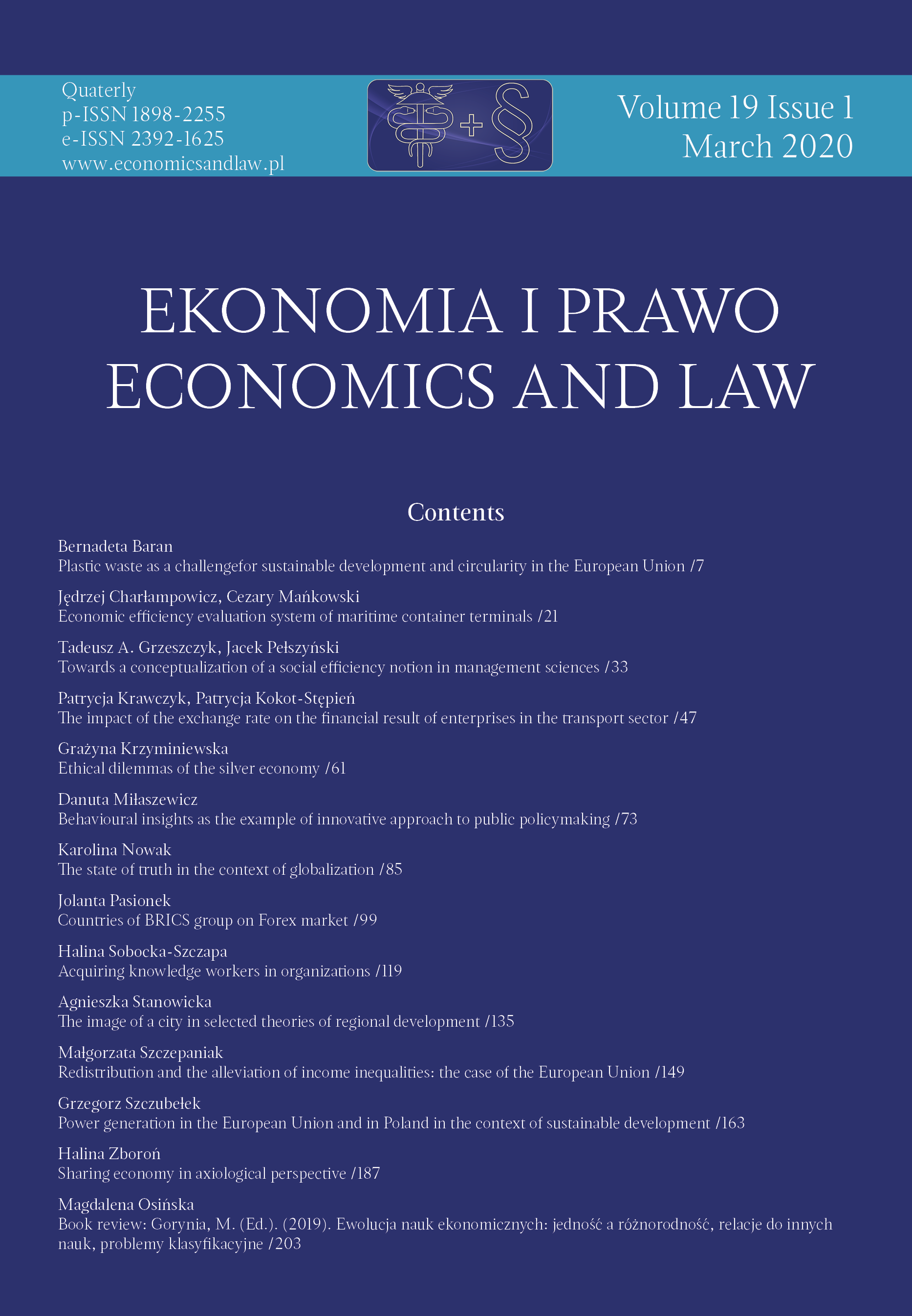Redistribution and the alleviation of income inequalities: the case of the European Union
DOI:
https://doi.org/10.12775/EiP.2020.011Keywords
income inequalities, redistribution, social transfersAbstract
Motivation: The income inequalities are considered an important economic and social problem, because increasing income inequalities may make it difficult to achieve such policy goals as: social cohesion and inclusive development. State’s interference through redistribution is aimed to decrease the differences between the rich and poor. Even though social transfers alleviate the income inequalities, the extent to which they decrease the gap between the rich and the poor is different in European Union (EU) countries. The answer to the question of redistribution effectiveness is extremely important from this perspective.
Aim: The article aims to present the diversity of EU countries from the perspective of income inequalities, social transfers (government expenditures on social protection, health and education) and finally redistribution. Its aim is also to assess the impact of social transfers on inequalities on the basis of dynamic panel data model.
Results: There is no significant relationship between the level of social transfers and Gini disposable income. However, the results of regression analysis proved that government expenditures on social protection significantly increase the difference between market and disposable income inequalities (Gini gap) and therefore more effectively decrease income inequalities.
References
Afonso, A., Schuknecht, L., & Tanzi, V. (2010). Income distribution determinants and public spending efficiency. Journal of Economic Inequality, 8(3). doi:10.1007/s10888-010-9138-z.
Agnello, L., Castro, V., Jalles, J.T., & Sousa, R.M. (2017). Income inequality, fiscal stimuli and political (in)stability. International Tax Public Finance, 24(3). doi:10.1007/s10797-016-9428-x.
Atkinson, A. (1996). Seeking to explain the distribution of income. In J. Hills (Ed.), New inequalities: the changing distribution of income and wealth in the United Kingdom. Cambridge–New York: Cambridge University Press. doi:10.1017/CBO9780511521935.002.
Bussolo, M., Krolage, C., Makovec, M., Peichl, A., Stockli, M., Torre, I., & Wittneben, C. (2018). Vertical and horizontal redistribution: the case of Western and Eastern Europe. Policy Research Working Papers, 275. doi:10.1596/1813-9450-8657.
Causa, O., & Hermansen, M. (2017). Income redistribution through taxes and transfers across OECD countries. OECD Economics Department Working Papers, 1453. doi:10.1787/bc7569c6-en.
Dorrenberg, P., & Peichl, A. (2014). The impact of redistributive policies on inequality in OECD countries. Applied Economics, 46(17). doi:10.1080/00036846.2014.892202.
Easterly, W. (2007). Inequality does cause underdevelopment: insights from a new instrument. Journal of Development Economics, 84(2). doi:10.1016/j.jdeveco.2006.11.002.
Eurostat. (2011). Manual on sources and methods for the compilation of COFOG statistics: classification of the functions of government (COFOG). doi:10.2785/16355.
Eurostat. (2019). Retrieved 10.01.2020 from https://ec.europa.eu.
Fuest, C., Niehues, J., & Peichl, A. (2010). The redistributive effects of tax benefit systems in the enlarged EU. Public Finance Review, 38(4). doi:10.1177/1091142110373480.
Jenkins, S.P., Brandolini, A., Micklewright, J., &Nolan, B. (2011). The great recession and the distribution of household income. Oxford: Oxford University Press. doi:10.1093/acprof:oso/9780199671021.001.0001.
Niehues, J. (2010). Social spending generosity and income inequality: a dynamic panel model approach. IZA Discussion Paper Series, 5178. doi:10.2139/ssrn.1724733.
OECD. (2012). Income inequality and growth: the role of taxes and transfers. OECD Economics Department Policy Notes, 9.
OECD. (2015). In it together: why less inequality benefits all? Paris: OECD Publishing. doi:10.1787/9789264235120-en.
OECD. (2019). Retrieved 10.01.2020 from https://www.oecd.org.
Osińska, M. (Ed.). (2007). Ekonometria współczesna. Torun: TNOiK.
Roed, K., & Strom, S. (2002). Progressive taxes and the labour market: Is the trade-off between equality and efficiency inevitable? Journal of Economic Surveys, 16(1). doi:10.1111/1467-6419.00160.
Sachs, J.P. (2012). From millennium development goals to sustainable development goals. Lancet, 379(9832). doi:10.1016/s0140-6736(12)60685-0.
Stiglitz, J.E. (2013). The price of inequality: how today’s divided society endangers our future. New York: W.W. Norton & Company.
Szczepaniak, M. (2018). Nierówności dochodowe w wybranych krajach na tle systemów społeczno-gospodarczych. Nierówności Społeczne a Wzrost Gospodarczy, 55(3). doi:10.15584/nsawg.2018.3.11.
Downloads
Published
How to Cite
Issue
Section
Stats
Number of views and downloads: 857
Number of citations: 0
